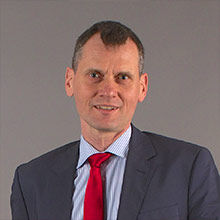Transformation of production processes
In today's information society, the internet is the mostimportant technology and the driving force of societal and economic transformation.In sectors using information and communications technology (ICT) as the platformfor innovation, the meaning of the term "work" is undergoingfundamental change. Global connectivity is leading to problems of definitionbetween work and leisure, between professional output and play. There arelasting changes as regards working conditions and qualification requirements ininnovative business areas. As regards competitiveness, highly skilled staff, educationand training as well as knowledge management are all playing an increasinglyimportant role. There is already an appreciable shortage of qualified labourespecially in the high-tech sectors -despite the high overall unemploymentrate. In a knowledge-based society, the relationship between employees andemployers is characterised by greater dynamic. Ulrich Klotz, member of the Boardof the German Metalworkers' Union (IG Metall), has outlined the changes causedby the technological revolution as follows: "The work will still be there,but not the stable job. In the future, a job will come to be seen again as somethingyou do rather than something you have"1.
In the post-industrial information society, work withmaterial products has been pushed to the sidelines while digital goods andservices have taken centre-stage. Today, two in five employees in Germany are using a computer for at least half their working day, and every third employee hasaccess to the internet. Highly qualified jobs in the high-tech sector areincreasingly becoming a driving force for economic prosperity. Technologicalinnovation and economic growth are mutually reinforcing. Both are based oncomplementary investment in physical and human capital. For this reason, moderneconomic and structural policy is increasingly defined by educational measures.
Source: &sec=article&uinfo=<%=server.URLEncode(1739)%>"target="_blank">www.dbresearch.com
About the Author:
The authoris working as Senior Economist at Deutsche Bank Research since 2000. His mainresponsibilities are the economic analysis of structural changes caused byinnovative information and communications technologies. Before moving toDeutsche Bank, Dr. Heng worked in a Research Group of DeutscheForschungsgemeinschaft (German Research Foundation). He was awarded a doctorateby the University of Mannheim in 2000 for his thesis about the economic impactsof road traffic in Germany. Dr. Heng is the author of several studies andessays. Amongst others he is affiliated as referee to the InternationalTelecommunications Society (ITS), and as Young Leader to the Atlantic Bridge association.










Comments